|

by Elina St-Onge
2014
excerpted from
How
to Change the World
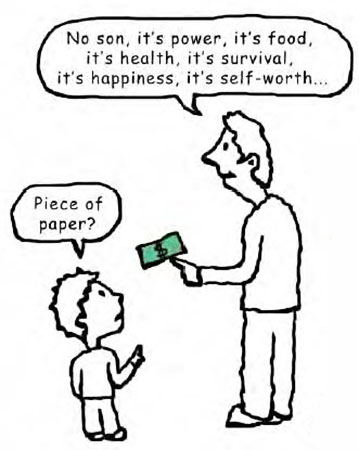
First of all, what is money? Rectangular pieces of paper, circular
pieces of metal or digits on a computer screen.
And what is it for?
-
The more money you have, the
more you have access to resources such as food, transport,
shelter, clothing, technology, luxury and so on.
-
The less money you have, the
harder it is to have access to these resources, and the more
your life becomes centered on survival.
Plain and simple:
you are not supposed to survive
without money.
According to society, money equals life.
That is why earning a living is
synonymous with earning money. That is why
our education system itself is
modeled to make everyone fit for the job market more than anything
else.
That is why passion and creativity is
not considered as important as simply getting the job that will
allow you to survive.
If it were not for money, most people
would not willingly go and do things like shuffle paper or input
data into a computer all day.
"'Normal' is getting dressed in
clothes that you buy for work and driving through traffic in
a car that you are still paying for - in order to get to the
job you need to pay for the clothes and the car, and the
house you leave vacant all day so you can afford to live in
it."
Ellen Goodman
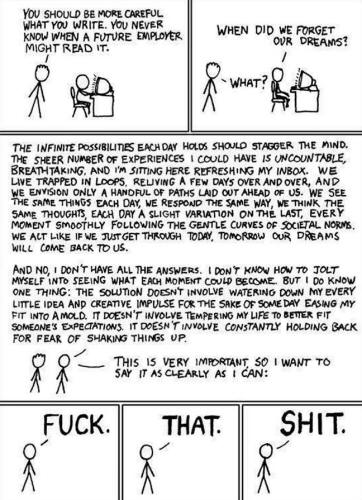
If we are lucky, we are able to earn a living doing something that
we love.
But most people work simply because they
have to. We have to work to pay our bills. We have to work to earn
the food that is on our plate. It does not matter if we are homeless
and starving; the rule says that we cannot feed ourselves without
money.
We could end the story there, stop
questioning, go on with our lives and decide that money will and
should always rule.
But how about asking even more basic
questions:
The answer is ownership.
Since almost everything is owned on the
planet, we need to work and pay for pretty well everything.
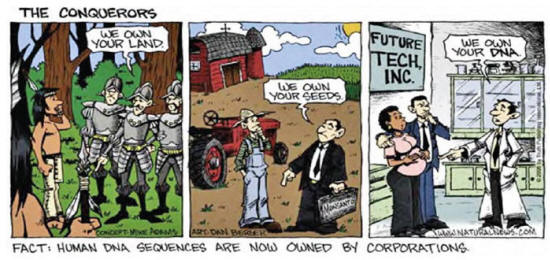
"LAND:
A part of the earth's surface,
considered as property.
The theory that land is property subject to private ownership
and control is the foundation of modern society, and is
eminently worthy of the superstructure.
Carried to its logical conclusion,
it means that some have the right to prevent others from
living."
Ambrose Bierce
# 1 -
OWNERSHIP & HIERARCHY
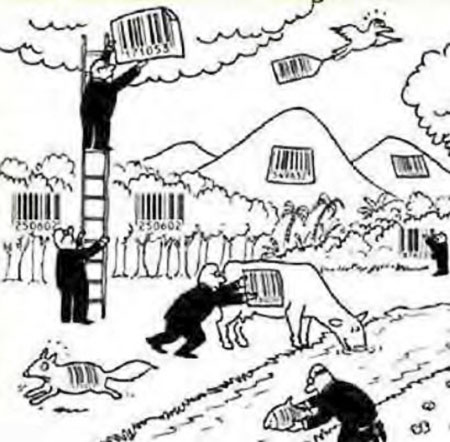
In a global context, ownership is the concept where individuals can
take possession of what is already freely given by the Earth - such
as land, water, food or even energy - and can choose to forbid
others from having access to them unless they are willing to pay.
Ownership is the very foundation of the
money system.
If nothing were owned, there would be
nothing to sell back to the population and thus no economic growth.
"Basically, economic growth means
that you have to find something that people once got for free,
or did for themselves or for each other, and then take it away
and sell it back to them somehow."
Charles Eisenstein
Ownership is a product of the ingrained
belief that there will never be enough space, opportunity and
resource in the world for everybody to share.
This has in turn made the concepts of
competition, "survival of the fittest," rich and poor, and ruler and
ruled - a reality amongst the human race. One where you must earn
your spot in the world, hold on to it, own it, protect it and
ideally profit from it.
The concept of ownership is what makes it possible for a few to
monopolize land and resources while the majority become subject to
their rules and conditions. This has created a human society based
on a pyramidal structure:
the powerful few at the top and the
rest of humanity at the bottom.
We call it a "hierarchy..."
By definition, a hierarchy is a system in which people or groups are
ranked one above the other according to their level of authority,
status, control and privilege. In the context of a global hierarchy,
the higher you are ranked, the wealthier you are and the more power
you have over the earth and its people.
The lower you are ranked, the more you
have to abide by the rules dictated from above and/or slave to
survive in the world. Many would be quick to label this as one of
those "conspiracy theories."
But as much as this hierarchy sounds
harsh, it is not some hidden information written by a guy in a
tinfoil hat. It is in fact "hidden" in plain sight. This system is
considered the norm and has been given a popular name:
Social Class.
To keep it simple for people, the global
hierarchy has been divided in four social classes:
-
the upper class
-
the middle class
-
the lower class
-
the underclass
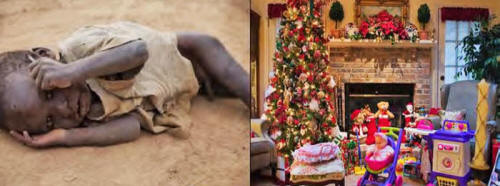
-
The Underclass is often
overlooked and represents the most disadvantaged people
within the social hierarchy.
It consists of the poor,
homeless, disabled and unemployed whom have no participation
whatsoever within the system. Members of the underclass
often inherited this lifestyle from their impoverished
family or country.
They usually struggle to survive
or simply fail to survive - unless they are able to
become members of the working class and earn enough money to
feed themselves.
-
The Lower Class and Middle Class
(Working Class) are terms used to represent those who do
what the system sets out for them: work, pay taxes and pay
bills.
-
The Lower Class consists
of people on a low income who can barely afford to
keep up with bills.
-
The Middle Class refers
to people with a higher income who can live
comfortably if they are willing to keep working.
-
The Upper Class is commonly
referred to as the "rich and powerful."
Millionaires, politicians and
celebrities are its most widely known members. However, a
less talked about portion of the upper class could be
referred to as 'the owner class.'
They belong to the very top of
the hierarchy and their wealth is generated by how much
land, resources and major industries they own and profit
from - as opposed to how much money they were able to make
through regular commercial activity.
These individuals have no
financial limitations, wield the greatest political power
and exert the most control over the use of natural
resources.
While
they make up only 1% of the overall
population, they own and control a
disproportionately large amount of the overall wealth and
resources of the world.
"The members of the tiny capitalist
class at the top of the hierarchy have an influence on economy
and society far beyond their numbers.
They make investment decisions that
open or close employment opportunities for millions of others.
They contribute money to political parties, and they often own
media enterprises that allow them influence over the thinking of
other classes...
The capitalist class strives to
perpetuate itself: Assets, lifestyles, values and social
networks... are all passed from one generation to the next."
Dennis Gilbert
The American Class Structure
WHO ARE THEY?
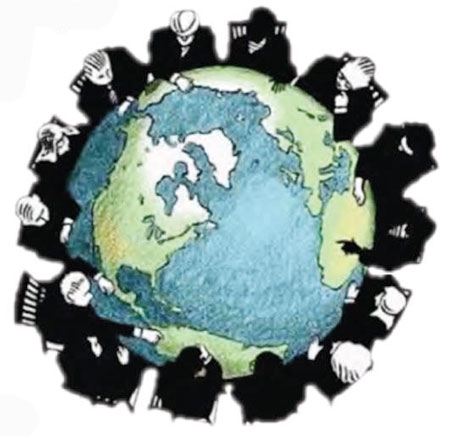
This elite is made up of,
They do not partake in the system
like everybody else; they run it.
They do not deliver political
speeches on television; they pull the strings behind the scenes.
Such individuals are often born into it and their immense wealth
is passed from generation to generation in order to maintain the
high status, nobility and power within their bloodline.
The
Royal Family,
the Rothschild's,
the Rockefeller's and the
Morgan's - amongst several
other bloodlines - all are key
players within this elite.
Their power is symbolically
represented on the back of the US dollar bill by the
"all-seeing-eye" at the top of the hierarchy. These same
families are traceable throughout our history and have always
been at the forefront of the money system.
Although many private societies are
tied to the elite, the most publicly known groups in which they
are involved in are,
...all of which were
"coincidentally" created by one or more of the elite bloodlines.
These five organizations are the key
rulers and decision-makers in the sphere of politics, banking,
business, military, education, religion, media, energy, health
and agriculture.
Although most of these organizations
are not so secret, what goes on inside of them is - hence why
the media is forbidden to cover what transpires at the annual
Bilderberg meetings.
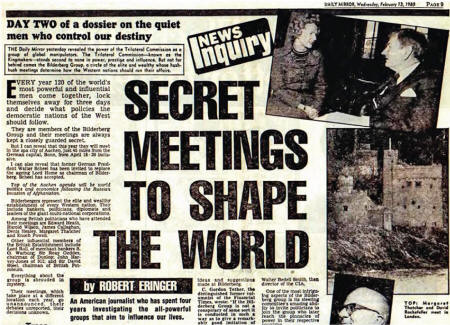
"The world is governed by very different personages from
what is imagined by those who are not behind the scenes."
Benjamin Disraeli
first Prime Minister of
England
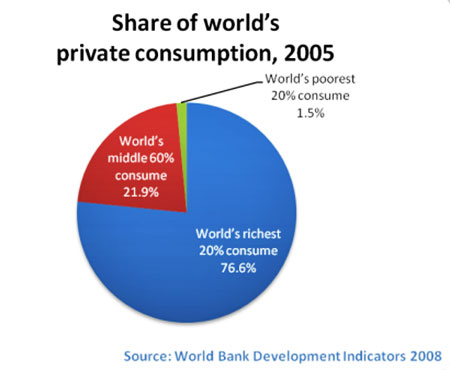
The wealth gap between the upper
class and the underclass families who cannot even afford a meal is
outrageous, however many people consider it an inevitable part of
life.
It is believed that poverty is the
result of overpopulation, poor education, racial inferiority or even
laziness.
But because most people never think to
question the concepts of hierarchy and ownership, few
realize that they represent an important building block in today's
inequality of consumption.
The passage below describes this reality
very well:
THE CAUSE OF POVERTY
Is it Overpopulation or Who Owns and Controls The Land?
"The often heard comment (one I
once accepted as fact) that 'there are too many people in
the world, and overpopulation is the cause of hunger', can
be compared to the same myth that expounded
sixteenth-century England and revived continuously since.
Through repeated acts of
enclosure the peasants were pushed off the land so that the
gentry could make money raising wool for the new and highly
productive power looms.
They could not do this if the
peasants were to retain their historic entitlement to a
share of production from the land. Massive starvation was
the inevitable result of this expropriation. (…)"
There were serious discussions in
learned circles about overpopulation as the cause of this
poverty.
This was the accepted reason because
a social and intellectual elite were doing the rationalizing. It
was they who controlled the educational institutions which
studied the problem. Naturally the final conclusions (at least
those published) absolved the wealthy of any responsibility for
the plight of the poor.
The absurdity of suggesting that
England was then overpopulated is clear when we realize that,
'the total population of England
in the sixteenth century was less than in any one of several
present-day English cities.'
The hunger in underdeveloped
countries today is equally tragic and absurd.
Their European colonizers understood
well that ownership of land gave the owner control over what
society produced. If ever re-established, this ancient practice
would reduce the rights of these new owners.
For this reason, much of the land
went unused or underused until the owners could do so
profitably. This is the pattern of land use that characterizes
most Third World countries today, and it is this that generates
hunger in the world.
These conquered people are kept in a state of relative
impoverishment.
Permitting them any substantial
share of the wealth would negate the historic reason for
conquest - namely plunder. The ongoing role of Third World
countries is to be the supplier of cheap and plentiful raw
materials and agricultural products to the developed world.
Nature's wealth was, and is, being controlled to fulfill the
needs of the world's affluent people.
The U.S. is one of the prime beneficiaries of this
well-established system. Our great universities search
diligently for 'the answer' to the problem of poverty and
hunger.
They invariably find it in,
'lack of motivation, inadequate
or no education,' or some other self-serving excuse.
They look at everything except the
cause - the powerful own the world's social wealth.
As a major beneficiary, we have much to gain by perpetuating the
myths of overpopulations, cultural and
racial inferiority, and so forth.
The real causes must be kept from
ourselves, as how else can this systematic damaging of others be
squared with what we are taught about democracy,
rights, freedom, and justice?
J.W. Smith
The World's Wasted Wealth: the
political economy of waste
(New World's Press, 1989), pp.
44, 45.
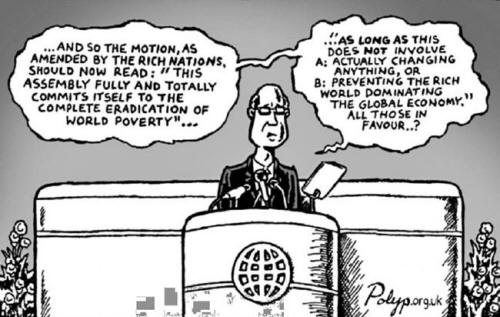
DID YOU KNOW?
Source:
globalissues.org
-
An analysis of long-term trends
shows the distance between the richest and the poorest
countries was about:
-
3 to 1 in 1820
-
11 to 1 in 1913
-
35 to 1 in 1950
-
44 to 1 in 1973
-
72 to 1 in 1992
-
More than 80% of the world's
population lives in countries where income differentials are
widening.
It is well enough that there is a huge
gap between the world's rich and poor, but,
The one word answer: debt.
# 2 - DEBT
"And to preserve independence, we
must not let our leaders load us with perpetual debt. We must
make our election between economy and liberty, or profusion and
servitude."
Thomas Jefferson
Ever wonder where money comes from?
Many people still believe that it is the
government who creates money and that it does so in proportion to
how much gold exists in reserve. However, both assumptions are
false.
Private central banks create money
- not by printing it, minting coins or moving around precious metals
- but by simply typing it into existence whenever a
borrower asks for a loan.
Yes, money is created out of thin air.
As stated by the Boston Federal Reserve,
"When the Federal Reserve writes a
check, it is creating money."
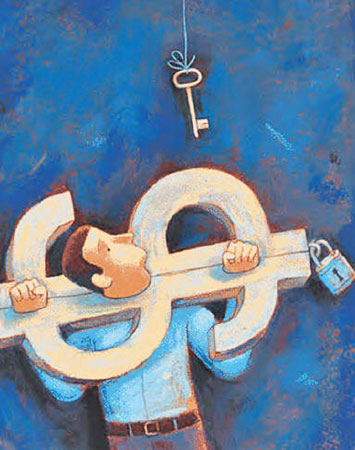
The catch is:
whenever money is borrowed into
existence, bankers expect it to be paid back with interest.
However, the interest attached to each
loan is never created.
This means that the debt generated by
interest rates will always exceed the total amount of money in
circulation.
No, the banks do.
Therefore, we need to repeat the cycle of borrowing more money to
the banks.
But more loans equal more debt.
Welcome to the debt-based monetary
system...
"Banks lend by creating credit. They
create the means of payment out of nothing."
Ralph M. Hawtry
former secretary of the treasury
DID YOU KNOW?
-
?For every $1 in aid a
developing country receives, over $25 is spent on debt
repayment to the rich. (2008,
globalissues.org)
-
$550 billion has been paid
in both principal and interest over the last three
decades, on $540 billion of loans, and yet there is
still a $523 billion debt burden. (2005,
globalissues.org)
-
Debt kills. Around 11
million children die each year due to conditions of
poverty and debt. (globalissues.org)
"The history of third world debt
is the history of a massive siphoning-off by international
finance of the resources of the most deprived people.
This process is designed to
perpetuate itself, thanks to a diabolical mechanism whereby
debt replicates itself on an even grander scale, a cycle
that can only be broken by cancelling the debt."
Third World Debt, a
Continuing Legacy of Colonialism

The more you are able to make the world be indebted to you, the more
you can manipulate the population into spending their entire
lives trying to survive as debt slaves to your self-serving
system.
This is the intention behind our modern
banking system.
Mortgages, taxes, credit cards, payment
plans… all of it is designed to perpetuate debt, since it is debt
itself that feeds this economic machine.
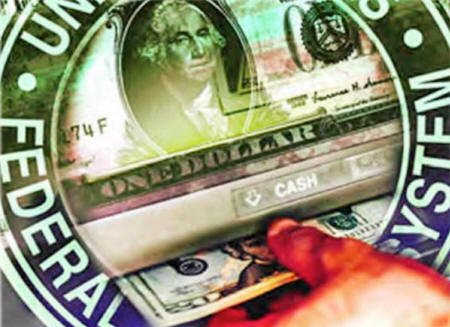
Instead of going into greater detail about the workings of our
debt-based economy here, below are links to documentaries and videos
covering the subject matter in greater detail.
DOCUMENTARIES - Money System
"We protest not only at our
exclusion from the American Dream; we protest at its bleakness.
-
If it cannot include
everyone on Earth, every ecosystem and bioregion, every
people and culture in its richness
-
If the wealth of one must be
the debt of another
-
If it entails sweatshops and
underclasses and fracking and all the rest of the
ugliness our system has created,
...then we want none of it."
Charles Eisenstein
# 3 - DEPENDENCY
In addition to the perpetual debt it creates, the monetary system
needs the population to continually buy new stuff and pay for
services, or else it will collapse.
Notice how we are commonly referred to
as "consumers" rather than human beings.
That is because a consumer is what the
powers that be need us to be. In order to uphold this economy, it is
necessary to create mental and/or physical dependency to industries,
whether it is the banking industry, the pharmaceutical industry, the
oil industry, the food industry, the beauty industry etc.
Creating dependency is crucial for the
few to overpower the many.
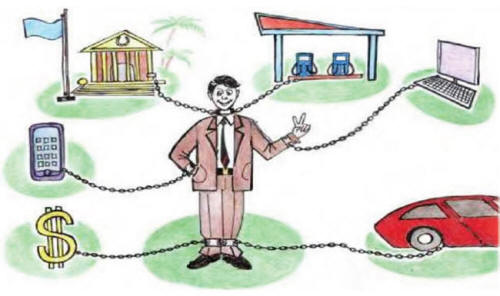
"The few who understand the system
will either be so interested in its profits or be so dependent
upon its favors that there will be no opposition from that
class.
While on the other hand, the great
body of people, mentally incapable of comprehending the
tremendous advantage that capital derives from the system, will
bear its burdens without complaint, and perhaps without even
suspecting that the system is inimical to their interests."
The Rothschild brothers of
London
writing to associates in New
York, 1863
Dependency is created in 3 simple steps.
-
First, you must create something
- whether it be the first dollar in existence, a service or
a product (this step is to be skipped of course in the case
of natural resources)
-
Secondly, you must claim
ownership of it
-
Thirdly, you must ensure that
others will continually need (or think they need) to get it
from you
Then, you're in control...
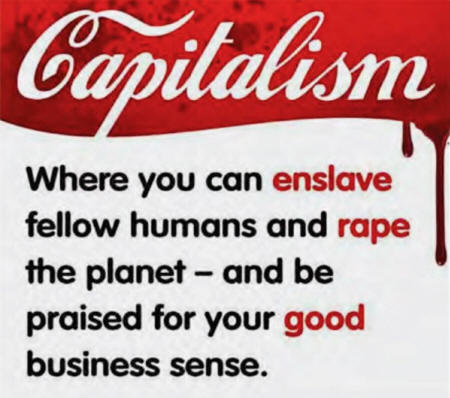
However, if you do not claim ownership and control over resources -
or create meaningful products and systems that would allow people to
be self-sufficient - your power hungry or profit-making mentality is
quite useless.
You would have to be okay with creating
and providing solely for the greater good and freedom of all - even
if it means they will no longer depend on you - instead of thinking
solely in terms of short-term personal gain.
This is obviously not good for business.
It is only a matter of observation to see how major industries
altogether form an interlocked web of dependency that feed each
other by creating more need, instead actually
liberating the world from need.
Because of this business model, the
natural desire to contribute for the betterment of all has gradually
been replaced by the robotic desire to accumulate numbers and pieces
of paper.
We can see the result of this
short-sightedness in today's industrial practices.
-
Manufacturers keep cutting
corners and producing lower-quality products with a shorter
lifespan to keep sales going (planned obsolescence).
-
Food companies ignore
health hazards in the name of cheaper fillers and chemical
additives to maximize flavor and prolong shelf life.
-
The
medical industry
prioritizes the creation of dependant "pill-takers" simply
because there is no money in healthy people.
-
Free energy technologies are
suppressed to protect the billion-dollar oil
industry.
-
Scams and false-advertisement
are considered legitimate business tactics.
-
The education system
prioritizes standardization to create good workers and
consumers, while human creativity takes the back burner.
This is perpetuating a world in which everyone focuses on competing
against each other, making money and hoarding mostly unneeded stuff,
as opposed to exploring our potential to co-create better products,
better systems and better lifestyles for the freedom and greater
good of the whole.
-
"Over-producing, over-consuming
and over-wasting" is the motto we live by, which does not
only ravage the planet but further deprives the poor.
-
"But it's good for the economy"
is what supposedly justifies this.
-
"But it's bad for the economy"
is what supposedly justifies the suppression of any
alternative that would not be about profit but about truly
benefiting the world.
Our old ways may be profitable to a
system that thrives on controlling the masses by maintaining a
hierarchy of power, but the price is high when you think in terms of
freedom and human evolution.
"Now, why are they going to war?
Why isn't alternative energy used
instead of oil? Why aren't all the hungry and homeless fed and
sheltered? Why are people suffering in trafficking? Why is there
a huge drug trade in the world?
Why is the rainforest cut down? Why
are the oceans overfished?
Why? Why?? Why???
And the answer is:
-
Profit
-
Money
-
Greed
-
Property"
Harald Sandø
The following quotes are from thinkers and whistleblowers that
understand how each of the major industries of our world prioritize
the creation of dependency as opposed to enabling freedom and truth.
Please consider doing your own
research about each industry to further substantiate the
following points.
POLITICS
"Presidents are selected, not
elected."
Franklin D. Roosevelt
"I don't vote as I believe
democracy is a pointless spectacle where we choose between
two indistinguishable political parties, neither of whom
represent the people but the interest of powerful business
elites that run the world."
Russell Brand
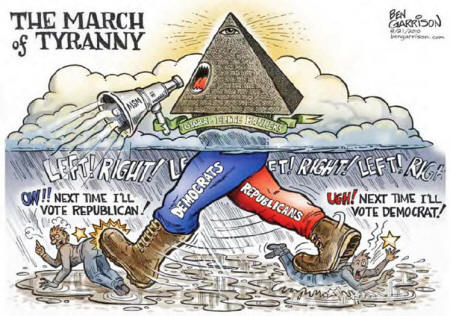
PHARMACEUTICAL/HEALTH INDUSTRY
The Pharmaceutical Industry
Does Not Create Cures,
They Create Customers
"I would like to dispel the myth
that the pharmaceutical industry is in the business of
health and healing, because, in fact, what the
pharmaceutical industry is in the business of doing is
'disease maintenance' and 'symptoms management.'
They are not in the business to
cure Cancer, to cure Alzheimer's, to cure heart disease
because if they were, they would be in the business of
putting themselves out of business; and that in fact doesn't
make sense."
Gwen Olson
former pharmaceutical
representative

FOOD INDUSTRY
Healthy Locally Grown Organic Food
has No Economic Value
"Industrial food manufacturing
involves appropriating raw materials from nature and turning
them into profitable commodities.
Kellogg, for example, takes
whole corn, removes almost all naturally occurring
nutrients, adds sugar, salt, and chemical additives to
maximize flavor, stability, and shelf life, and puts the
ingredients through a complex manufacturing process to
create Corn Pops […]
Other food companies like
McDonald's, and
Coca-Cola also maximize
profit by taking raw materials such as wheat, potatoes,
salt, and sugar and process them with chemical additives.
Companies make more money
selling unhealthy food because truly healthy
food doesn't come in a box. They simply cannot produce
healthy food in a way that both maximizes profits and
benefits public health."
Michele Simon
JD, MPH, public health lawyer
who has been researching and
writing about the food industry and food politics since
1996.
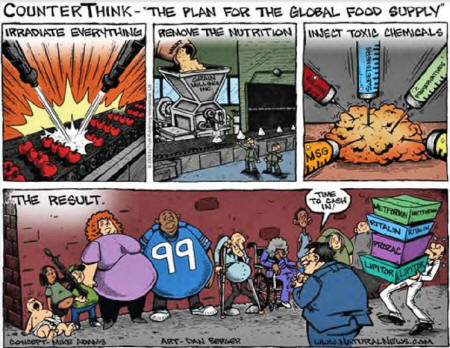
SEED INDUSTRY
"Once they have established the
norm that seed can be owned as their property and royalties
can be collected, we will depend on them for every seed we
grow of every crop we grow.
If they control seed, they
control food, they know it, it's strategic. It's more
powerful than bombs, it's more powerful than guns. This is
the best way to control the populations of the world."
Vandana Shiva
Philosopher,
environmentalist, author
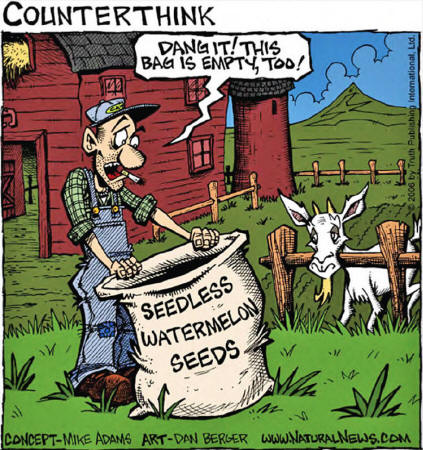
ENERGY INDUSTRY
"J.P. Morgan got Lorentz to
cripple the Heaviside equations so that the new EE
(electrical engineering) concepts being taught in the
universities would not ever contain free energy and over
unity systems.
This deliberate mutilation and
crippling of electrical engineering is the real and single
cause of our dependence on oil and of much of the pollution
of our biosphere…
The 'High Cabal' - Churchill's
name for the
secret consortium of elite families
and organization we loosely refer to as the 'control groups'
- has been ruthlessly suppressing free energy inventors for
a century, including by direct assassination.
Having personally survived
several such assassination attempts, I have experienced what
I'm speaking of."
Tom Bearden
Inventor, Author, Energy from
the Vacuum
"If these new energy technologies were to be set free
world-wide, the change would be profound; it would affect
everybody: it would be applicable everywhere.
These technologies are
absolutely the most important thing that has happened in the
history of the world."
Brian O'Leary
Physics Professor, NASA
Astronaut
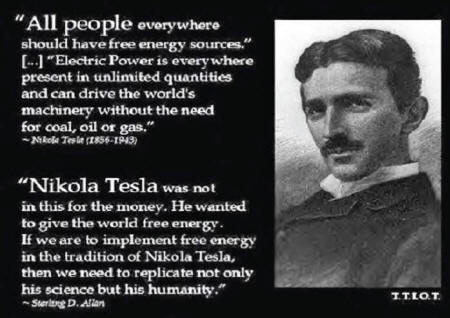
ARMS INDUSTRY
You Can't Feed The Poor But You
Can Fund A War?
"War is a racket. It always has been. It is possibly the
oldest, easily the most profitable, surely the most vicious.
It is the only one international
in scope. It is the only one in which the profits are
reckoned in dollars and the losses in lives. A racket is
best described, I believe, as something that is not what it
seems to the majority of the people.
Only a small 'inside' group
knows what it is about. It is conducted for the benefit of
the very few, at the expense of the very many.
Out of war a few people make
huge fortunes."
Smedley D. Butler
(retired United States Marine
Corps Major General and two time Medal of Honor recipient)
"We'd be trundling through Taliban-controlled areas in
armored vehicles, dodging ambushes and hitting IEDs, and the
soldiers would be saying,
'We're funding both sides of
this war.'
It seemed preposterous at first.
But as I dug into the story, officers, diplomats, and aid
officials confirmed the rough outlines of the pernicious
system.
One sardonic US intelligence
officer told me,
'It's the perfect war.
Everyone is making money.'"
Douglas A. Wissing
Award-winning
independent journalist
MASS MEDIA
"(…) The ones who have access to
the media, including the intellectual journals, and who
essentially control the educational apparatus, should
properly be referred to as a class of 'commissars.'
That's their essential function:
to design, propagate and
create a system of doctrines and beliefs which will
undermine independent thought and prevent understanding
and analysis of institutional structures and their
functions."
Noam Chomsky
Chronicles of Dissent
"The bottom line is that the government is getting what they
ordered. They do not want your children to be educated. They
do not want you to think too much.
That is why our country and our
world has become so proliferated with
entertainments, mass
media, television shows, amusement parks, drugs, alcohol,
and every kind of entertainment to keep the human mind
entertained, so that you don't get in the way of important
people by doing too much thinking.
You better wake up and
understand that there are people who are guiding your life
and you don't even know it."
Jordan Maxwell
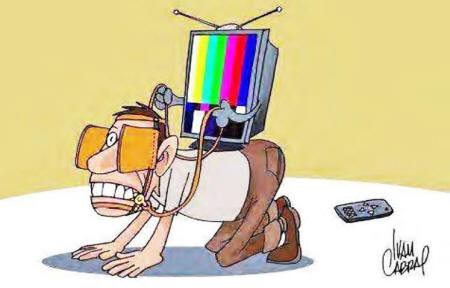
A system that is so 'sane', that the more successful it is in
its own terms, the quicker it destroys the planet.
It insists every year that we take
more from the earth even quicker, turn it into more things, sell
even more things, consume even more things, throw away even more
things, to worship the real god of the modern world - economic
growth...
It insists that every year 20% of the people of the world
consume 80% of the resources while leaving the other 80% to get
by on the remaining 20%.
Crazy? Of course it is!
This is the economic system - take,
make and throw away - that controls your life and mine, and of
the 6 billion people here.
David Icke
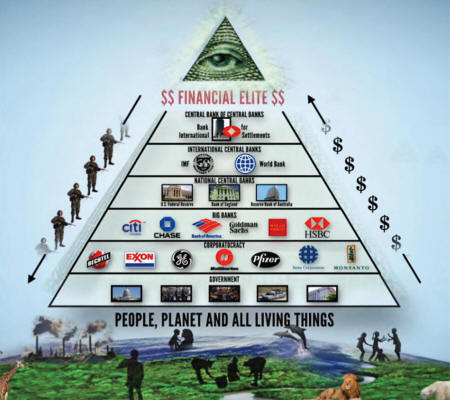
|






















